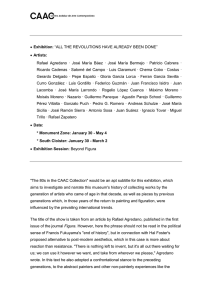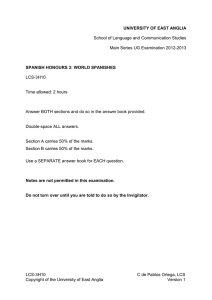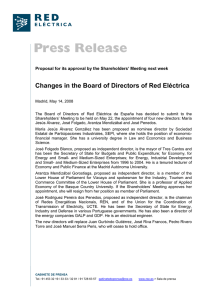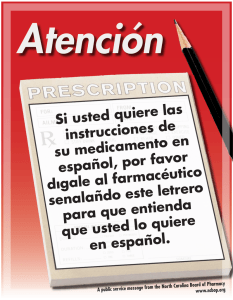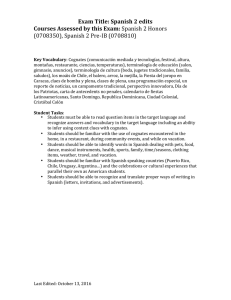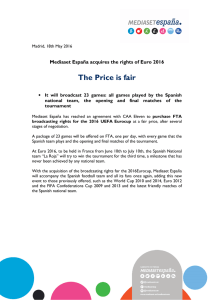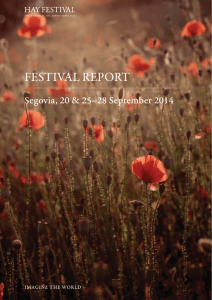José María Segovia de Arana: father and leader of
Anuncio
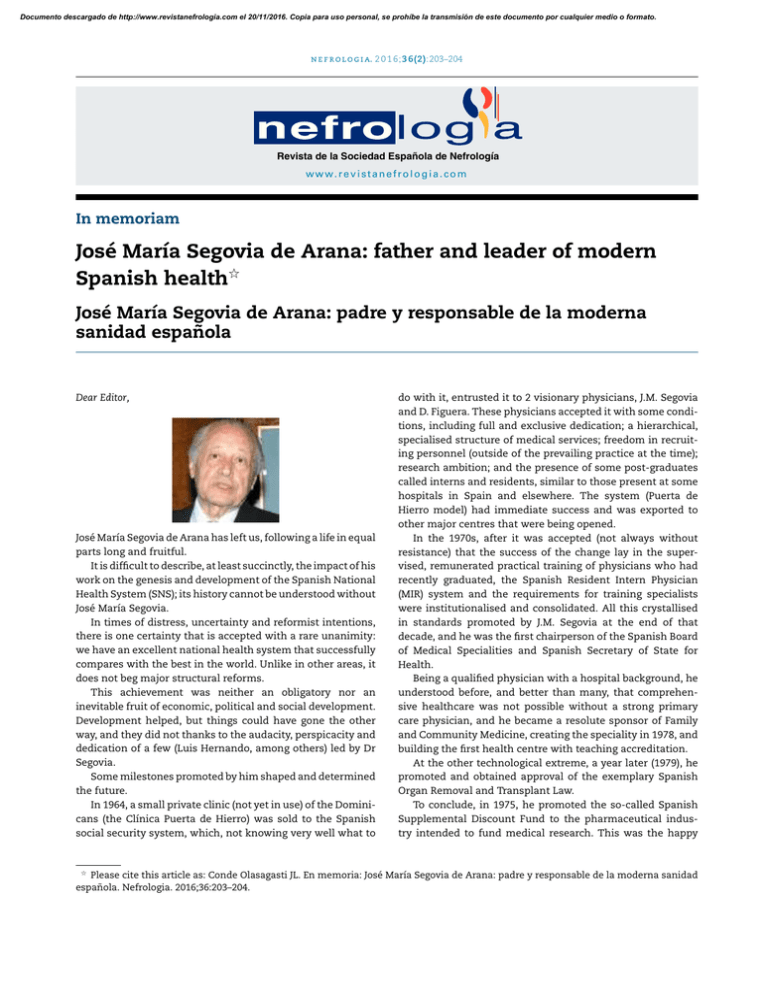
Documento descargado de http://www.revistanefrologia.com el 20/11/2016. Copia para uso personal, se prohíbe la transmisión de este documento por cualquier medio o formato. n e f r o l o g i a. 2 0 1 6;3 6(2):203–204 Revista de la Sociedad Española de Nefrología www.revistanefrologia.com In memoriam José María Segovia de Arana: father and leader of modern Spanish health夽 José María Segovia de Arana: padre y responsable de la moderna sanidad española Dear Editor, José María Segovia de Arana has left us, following a life in equal parts long and fruitful. It is difficult to describe, at least succinctly, the impact of his work on the genesis and development of the Spanish National Health System (SNS); its history cannot be understood without José María Segovia. In times of distress, uncertainty and reformist intentions, there is one certainty that is accepted with a rare unanimity: we have an excellent national health system that successfully compares with the best in the world. Unlike in other areas, it does not beg major structural reforms. This achievement was neither an obligatory nor an inevitable fruit of economic, political and social development. Development helped, but things could have gone the other way, and they did not thanks to the audacity, perspicacity and dedication of a few (Luis Hernando, among others) led by Dr Segovia. Some milestones promoted by him shaped and determined the future. In 1964, a small private clinic (not yet in use) of the Dominicans (the Clínica Puerta de Hierro) was sold to the Spanish social security system, which, not knowing very well what to do with it, entrusted it to 2 visionary physicians, J.M. Segovia and D. Figuera. These physicians accepted it with some conditions, including full and exclusive dedication; a hierarchical, specialised structure of medical services; freedom in recruiting personnel (outside of the prevailing practice at the time); research ambition; and the presence of some post-graduates called interns and residents, similar to those present at some hospitals in Spain and elsewhere. The system (Puerta de Hierro model) had immediate success and was exported to other major centres that were being opened. In the 1970s, after it was accepted (not always without resistance) that the success of the change lay in the supervised, remunerated practical training of physicians who had recently graduated, the Spanish Resident Intern Physician (MIR) system and the requirements for training specialists were institutionalised and consolidated. All this crystallised in standards promoted by J.M. Segovia at the end of that decade, and he was the first chairperson of the Spanish Board of Medical Specialities and Spanish Secretary of State for Health. Being a qualified physician with a hospital background, he understood before, and better than many, that comprehensive healthcare was not possible without a strong primary care physician, and he became a resolute sponsor of Family and Community Medicine, creating the speciality in 1978, and building the first health centre with teaching accreditation. At the other technological extreme, a year later (1979), he promoted and obtained approval of the exemplary Spanish Organ Removal and Transplant Law. To conclude, in 1975, he promoted the so-called Spanish Supplemental Discount Fund to the pharmaceutical industry intended to fund medical research. This was the happy 夽 Please cite this article as: Conde Olasagasti JL. En memoria: José María Segovia de Arana: padre y responsable de la moderna sanidad española. Nefrologia. 2016;36:203–204. Documento descargado de http://www.revistanefrologia.com el 20/11/2016. Copia para uso personal, se prohíbe la transmisión de este documento por cualquier medio o formato. 204 n e f r o l o g i a. 2 0 1 6;3 6(2):203–204 precedent of the successful Spanish Social Security Healthcare Research Fund (FISSS), now the Spanish Healthcare Research Fun (FIS), that he himself created in 1980 and that has endured and contributed to improving the level of medical research in Spain in a way that few initiatives have. If there has ever been a leader with a strategic vision and audacity in management on the 20th century Spanish healthcare scene, without a doubt, Professor José María Segovia de Arana was that leader. May he rest in peace and eternal life in our grateful memory. Toledo, 4 January 2016 José Luis Conde Olasagasti Nephrology Service, Complejo Hospitalario, Toledo, Spain E-mail address: pconde11@hotmail.com 2013-2514/© 2016 Sociedad Española de Nefrología. Published by Elsevier España, S.L.U. All rights reserved. http://dx.doi.org/10.1016/j.nefroe.2016.04.005
